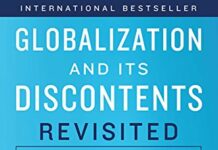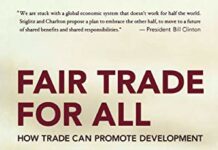
Ebook Info
- Published: 2007
- Number of pages: 374 pages
- Format: PDF
- File Size: 4.29 MB
- Authors: Joseph E. Stiglitz
Description
“A damning denunciation of things as they are, and a platform for how we can do better.”―Andrew Leonard, Salon Building on the international bestseller Globalization and Its Discontents, Joseph E. Stiglitz offers here an agenda of inventive solutions to our most pressing economic, social, and environmental challenges, with each proposal guided by the fundamental insight that economic globalization continues to outpace both the political structures and the moral sensitivity required to ensure a just and sustainable world. As economic interdependence continues to gather the peoples of the world into a single community, it brings with it the need to think and act globally. This trenchant, intellectually powerful, and inspiring book is an invaluable step in that process.
User’s Reviews
Editorial Reviews: Review “A brave book…. Stiglitz does an excellent job of describing dense topics… in language that’s understandable and accessible.” ― Russ Juskalian, USA Today”A searing critique of the conventional wisdom…. Stiglitz’s analysis is eye-opening… because it is consistent and comprehensive, and he writes with rare clarity and passion for a distinguished economist.” ― Jeffrey E. Garten, Newsweek”A well-written and informative primer on the major global economic problems. [Stiglitz] helps his readers understand exactly what is at stake.” ― Jeffry Frieden, New York Times Book Review”An excellent book… a lodestar for those who want to achieve a different and better world.” ― Guardian”You don’t have to agree with Stiglitz on every point to benefit from his creative thinking.” ― Peter Coy, BusinessWeek About the Author Joseph E. Stiglitz is a Nobel Prize–winning economist and the best-selling author of Globalization and Its Discontents Revisited: Anti- Globalization in the Age of Trump, The Price of Inequality, and Freefall. He was chairman of the Council of Economic Advisers under President Clinton, chief economist of the World Bank, named by Time as one of the 100 most influential individuals in the world, and now teaches at Columbia University and is chief economist of the Roosevelt Institute.
Reviews from Amazon users which were colected at the time this book was published on the website:
⭐There is a breed of economists who have what can only be described as a mystical reverence for the market. To them Adam Smith’s `invisible hand’ is not a merely a literary conceit but an actual force like electromagnetism or gravity. Following the advice of Milton Friedman these economists would privatize literally everything from primary education to road maintenance to social security. The government would act as a modest referee deciding property rights as well as defending borders. This is the mindset under which the IMF and World Bank operate. It’s the “Washington Consensus”, a one-size-fits-all solution to all economic problems and it’s been active for decades using the indefatigable wisdom of the “free market” to solve all the world’s ills.The problem is that the “Washington Consensus” as instituted by the IMF and World Bank has had disastrous results in many countries around the world most notably Russia. As the chief economist of the World Bank from 1997 to 2000, Joseph E. Stiglitz is probably a pretty decent source to go to for on why so many countries AREN’T booming after instituting IMF imposed “structural adjustments”. The author offers Argentina as an example of a country which received an A+ rating from the IMF for following the Washington Consensus only to face financial calamity a few short years later.As the author puts it, one of the main problems is that, “the Washington Consensus prescription is based on a theory of the market economy that assumes perfect information, perfect competition, and perfect risk markets”. Mr. Stiglitz writes, “policies have to be designed to be implemented by ordinary mortals”. Economists seem to have become so enamored by the blackboard theories behind pure free market economics that they ignore the reality of its results. Even worse, when economies follow the IMF’s prescription and fail they’re blamed for not adhering CLOSE ENOUGH to the IMF/World Bank dictates.The other main problem is that the Washington Consensus is being instituted in countries that simply do not have the institutions necessary for a free market economy including strong property rights, an established tax base and the means to enforce the rule of law. The shock treatment in Russia allowed money to flow freely in order to stimulate foreign investment but all it caused was the money to drain right out. The IMF/World Bank are very inflexible for instance they admonish countries for deficit spending, in order to stimulate the economy, even when a country has accrued a considerable amount of savings. At the same time the IMF/World Bank encourages low tax rates meaning that even modest economic stimulants can push a country into deficit spending. The scary thing is that even if a country doesn’t currently have loans with the IMF/World Bank they can still fear bucking the Washington Consensus given that a poor report from the IMF/World Bank can potentially scare away foreign investments.The author wisely points out that economic growth is only real if it is sustainable. American neo-conservatives love to crow about their pro-growth support but growth is pointless if you destroy the environment and rip up all the natural resources in a few decades. Using GDP as the de facto benchmark of a countries economic progress can be very misleading. As a case in point the author offers up oil production. The faster a country can rip oil out of the ground the higher its GDP will rise but in truth the country may well become LESS valuable as its resources are depleted. Compounded that with environmental damage, that isn’t being factored into the equation, and a country can become poorer as its GDP rises. This is not just some abstract case but a situation that occurs frequently.The author discusses a lot more topics including the often anti-democratic nature of the IMF/World Bank, issues of asymmetric globalization between developing and developed nations, the stifling nature of over patenting, subsidies versus tariffs. For an economics book I found it to be very readable and extremely enlightening. Mr. Stiglitz is clearly on the progressive side of the political spectrum which is evident by his concern for the inequity in globalization. Fortunately the IMF and World Bank seem to be adjusting somewhat to the reality that strict adherence to the Washington Consensus isn’t the end all be all solution. Hopefully this is a sign that the times are a changin’. Hopefully.
⭐Joseph E. Stiglitz, 2001 Nobel Memorial laureate in economics, is already well known for his critique of the current economic policies which shape the development of globalization. In 2002, Stiglitz published Globalization and its Discontents and shifted much of the blame for the “wrong-doing” committed by globalization on such institutions as the International Monetary Fund (IMF), World Bank and World Trade Organization (WTO). Four years after publishing this work, Stiglitz recompiled his opinions in a new volume, Making Globalization Work. Here, he expounded his opinions on the limitations of capitalism, the political corruption present in international monetary institutions (such as the aforementioned three) and how the First World has consistently maneuvered the market to the disadvantage of developing countries. His arguments contain much merit and should be considered. Unfortunately, Stiglitz uses the book as a platform to attack pro-market economists without reconciling the fact that such classical economists such as Adam Smith had already shattered the myth that government policy represents capitalism.The first three chapters of Making Globalization Work are spent lambasting capitalism, liberalization and free trade for their handiwork in keeping the Third World from developing into the First World. He actually does little in outlying his own solutions, and instead uses the first part of the book to shape the reader’s opinion on existing economic policies and then organizing these policies under the common title of “capitalism”. From the very beginning, Joseph Stiglitz proves to be intellectually dishonest, or at least he himself misguided on what capitalism really is and what pro-market economists truly support. He, of course, is correct when putting much of the blame of current world poverty on such institutions as the IMF and WTO, but these are not capitalist institutions. Let us not forget that they came into existence through the legislation of international government, and they operate with the authority of the State. There is nothing remotely capitalistic in any world trade organization or association, for the simple fact that without governmental support they probably would simply cease to exist. In any case, it seems astonishing that Joseph Stiglitz is surprised that these institutions are ripe with corruption–any institution run by politicians and government bureaucrats is bound to be corrupted, as it is within the nature of bureaucracy.To give a full critique of Making Globalization Work within the confines of a short article is unrealistic. The errors made by Stiglitz deserve a book. Many of the mistakes made are elementary and careless, which is astounding given that it was a Nobel laureate which authored the book. This review will focus on two major inaccuracies. The two erroneous arguments covered are Stiglitz’ views on wages in a “globalized economy” and his extremely erred opinions on liberalizations and the effects of. To be fair to Stiglitz, one should also cover his arguments on patents, which at first seems like the most legitimate of all the cases he makes within the covers of Making Globalization Work. Unfortunately, even after analyzing these three positions, this review falls extraordinarily short on offering a complete critique of the book; at least, in the sense that it does not begin to scratch the surface of all of the mistakes committed.The Nobel laureate attempts to engage the issue of global warming and damage on the environment. Even if the reasons for global warming are still in dispute, it remains unclear whether government-led or regulatory policies will lead to more efficient production (because, only more efficient production can reduce the amount of pollutants emitted over the long-run) and Stiglitz does not make a good case otherwise. Not all environmental problems are relevant to carbon dioxide, the ozone layer or global warming. He also touches upon the problems of deforestation, arguing in support of regulatory political policies which in the past have already proved disastrous. Despite not having the time to objectively analyze Stiglitz’ opinions on these matters, they are very relevant and important topics to consider. The short response to pro-government positions is that only through privatization can deforestation be put to a halt. Apart from the environment, Stiglitz also covers the role of the multinational corporation in promoting, and simultaneously harming, world development, as well as the causes and effects of international debt (in regards to international debt, the subject will be treated to an extent in the exposition provided against the notion of the benefits provided by a global currency). These are all important issues which will have to be left for another day, as we have our plate full already.[…]
⭐Most or all of Stiglitz’s books read like sloppy first drafts, perhaps because they are just that. Many parts of this book barely rise to the level of generalizations and platitudes. The good parts, however, are very good. Particular highlights include: how the IMF has acted as a global collection agency for Goldman Sachs and their ilk (that is, extracting money from the very poor to pass on to the very rich); neoliberalism run amuck after the end of the Cold War (e.g., the fire sale of public assets in Russia); and the effects of NAFTA and Kyoto.
⭐I’ve not finished the book yet. But it worth. The book was printed in 2006 a while since then. But anyway what mr Stiglitz says its still applicable (2015). Well explained for the non-economists.Divided in what happened, and what can do. (and should be done for a better world).The globalization is made by the developed countries, they want trade without barriers, but (and its a big BUT) only when they they get profit for this trade. So it’s converted in a one way globalization. We sell to you our products, but we’r not going to buy yours.Well documented, as always. The prophets of liberalism and globalization can argue. But If look at the sources and at the statistics, you will be convinced yourself.100% recommended.
⭐excellent book
⭐Very good book
⭐Clinton政権と世界銀行で主要幹部を務めNobel経済学賞を受賞した筆者は、米国の主流派が信奉する自由市場経済は民主主義と情報公開の下ではよいが、それらが不充分な発展途上国では機能し難いと反対する反主流派だ。自由市場経済を発展途上国に要求したIMFの失敗例を列挙し、管理市場経済の中国とインドの発展を対照させている。しかも経済の国際化が先進国と特定業界の利益に叶う一方で、発展途上国と貧しい国民が搾取されているとする。 筆者はロンマンチストだ。貧困国と貧者の味方の立場で、貿易、知的財産権、資源産出国保護、環境、多国籍大企業の専横防止、無理な借款防止などの各局面で施策を提案する。ただ提案施策の多くはロマンチック過ぎ、一方的な貧者優遇の立場のため現実には反発が強く無理と思われる。だから華麗な経歴にあっても提案があまり取り上げられなかったのだろう。しかし第9章の新規世界基金の提案は傾聴に値する。まとめの第10章と共に必読であり、読み飛ばすと損をする。 経済国際化の問題点を豊富な具体例で理解し、改善の可能性がどの辺にあるかを考えさせられる本だ。
⭐
Keywords
Free Download Making Globalization Work in PDF format
Making Globalization Work PDF Free Download
Download Making Globalization Work 2007 PDF Free
Making Globalization Work 2007 PDF Free Download
Download Making Globalization Work PDF
Free Download Ebook Making Globalization Work





